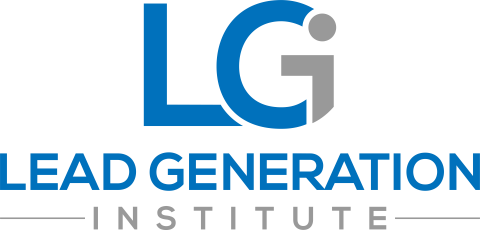Generating qualified leads is the core objective of every B2B marketing strategy in existence. Unlike B2Cs, a B2B company will have to work with a far smaller customer pool, making lead generation that much more important. Putting together a strong pipeline of incoming leads will ensure steady growth over the long term. When discussing the approach, B2B lead generation is all about understanding what strategies exist, and which work best, along with staying on top of the latest lead generation trends.
When looking at the research, there are challenges that many marketing professionals encounter across the board. Some 61% of marketers say that traffic and lead generation are their top marketing challenges. 39% say it’s deriving ROI from their digital marketing activities. It’s also important to add, [bctt tweet=”only 16% of B2B marketers consider their lead generation programs as very or extremely effective.” username=”LeadGenInst”]
80% of marketers who were surveyed consider their lead gen efforts to be only slightly or somewhat effective, while 4% don’t consider their efforts effective in the slightest. Whatever the case, 68% of B2B marketing professionals say that increasing the number of qualified leads is their top priority, while 55% say the same thing about increasing their lead volume. In both cases, effective lead generation is the solution.
What Is the Best B2B Lead Generation Channel?
In a study sponsored by the automation company Salesfusion, it was revealed that the three most commonly used lead generation strategies are Email Marketing (78%), Event Marketing (73%), and Content Marketing (67%). In a different study, this time conducted by Hubspot, SEO and Social Media Marketing are also included among the most commonly used strategies in terms of B2B lead generation.
Below, we will examine some of these effective B2B lead generation marketing channels to help you determine which will work best for your business.
Email Marketing
For decades, email marketing has been a top marketing channel for B2B lead generation. According to an Ascend2 report, 45% of marketers still consider email marketing as the most effective lead gen source. When used to its full potential, email marketing can generate an impressive 4,000% ROI. This means that for every dollar spent, companies can get $40 in return. It’s also the reason why 82% of today’s marketers use email marketing technology.
Marketing Automation Platforms (MAPs) are the latest trend in B2B email marketing. They work by sending automated, personalized, and highly-targeted emails to leads. They gather lead information from previous interactions across multiple channels and generate a customer persona. This data will then be used to develop personalized messages to gather, qualify, and convert leads. It’s also great for lead nurturing.
Event Marketing
Event marketing is another effective tactic employed within B2B lead generation strategies. Between 2017 and 2018, the total number of businesses organizing over 20 events per year increased by 17%. In fact, over 87% of C-suite execs are planning to invest more in live events in the foreseeable future.
Live events, be it trade shows, conferences, or seminars will allow both hosting companies and attendees to form authentic, in-person connections. Also, guests will form a better understanding and opinion of the brand, product, or service. Live events also help convert the majority of users who attend into repeat customers.
As a subset of event marketing, webinars are also an excellent B2B marketing channel for lead generation. Some 75% of executives attend at least one webinar per month, with the vast majority of them saying that webinars have influenced them in deciding on a particular brand and/or product. Webinars also help generate trust and a better reputation, helping your B2B company upsell its products and increase brand loyalty.
Content Marketing
Content creation is the foundation for most other digital marketing strategies. It shouldn’t come as a surprise that over 91% of B2B companies use content marketing in one form or another and with varying degrees of success. A comprehensive B2B content marketing strategy can be three times more effective at generating qualified leads and 62% less expensive than paid search and other traditional outbound methods. Content marketing can also be more difficult to implement correctly, as there is no one-size-fits-all approach.
Much of B2B content marketing’s lead generation success relies on testing and experimentation. Its success also relies heavily on having different content types for different personas at every stage of their buyer’s journey. By using different types of content at the right time, be it blog posts, videos, infographics, or lead magnets like ebooks, white papers, or case studies, lead generation and higher conversion rates become much easier. Content syndication and amplification are additional strategies worth exploring in order to boost your content marketing’s lead gen efficacy.
Organic SEO
It’s important to realize that over 89% of B2B decision-makers are on the internet looking for information about future purchases. Equally as important to know is that the overwhelming majority will not go beyond the first three results in a search engine results page (SERP).
As such, having your website pages listed among the first results in Google and other search engines should be a top priority. This is where organic search engine optimization (SEO) comes into play. A successful SEO strategy will require website optimization, landing page optimization, high-quality content, outreach, and link building. The major benefit of SEO as a B2B marketing strategy is that once implemented and maintained, it’s a gift that keeps on giving.
Social Media Marketing
Even though plenty of B2B marketers look at social media with a degree of skepticism in regard to its lead generation potential, two-thirds still report lead gen benefits when spending as little as six hours per week on social media marketing. Still, roughly half of marketers have difficulty implementing it. The biggest issue here is in terms of cost-per-lead, which differs significantly from one industry to the next. The best way of lowering this cost and maximizing social media ROI is by prioritizing social channels that will generate the most qualified leads for their respective B2B industries. In other words, social media marketing efforts should be focused on the platforms where your customers are most likely active users.
The top social channels for B2B lead generation are LinkedIn, Twitter, and Facebook. More than 95% of B2Bs use LinkedIn for content marketing, with 65% of them reporting successful lead generation results. In fact, 80% of all B2B leads generated over social media come from LinkedIn. Some 87% of B2B marketers also use Twitter for content marketing as a lead generation strategy, while 42% say Facebook helped them generate leads.
Honorable Mention: Telemarketing
Even though it’s not considered a top lead gen performer, telemarketing is still used by 14% of B2B marketers for early-stage engagement. However, this marketing channel shouldn’t be used in the traditional and often-dreaded cold-call fashion. B2B telemarketing in the form of warm calls generates the best results. These refer to phone calls after a prospect has already engaged with the brand or resulted from a referral. As such, telemarketing isn’t so much an effective standalone marketing channel for B2B lead generation as it is a way of enhancing the aforementioned strategies.
Say, you’ve hosted an event and gathered people’s contact information. You can use telemarketing to engage with these prospects at a later date. Likewise, it will be far easier to connect with leads after they’ve visited your website, engaged with you on social media, or have been referred to you by your customers. By using a marketing automation tool, you can take your telemarketing efforts to the next level. Since most MAPs use lead scoring, you will know precisely when to call your prospects for maximum effectiveness and conversion rate optimization.
For more information on B2B lead generation best practices, feel free to subscribe to our newsletter and get the latest delivered to your inbox.



